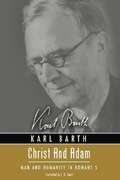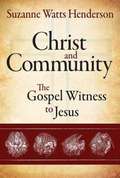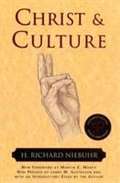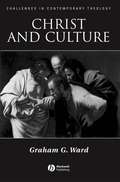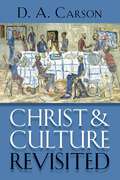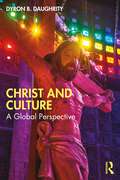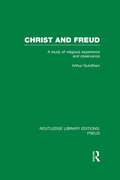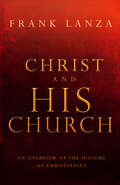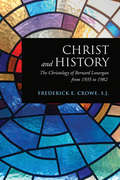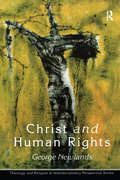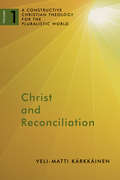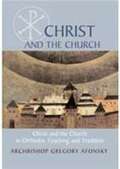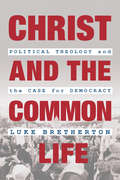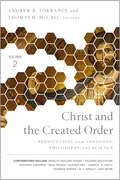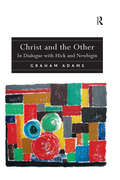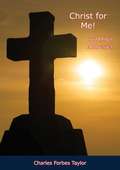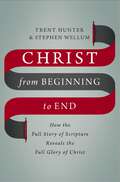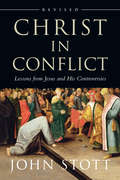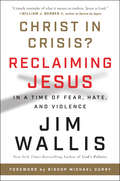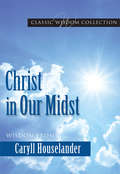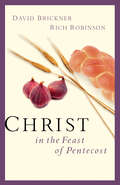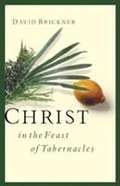- Table View
- List View
Christ and Adam: Man and Humanity in Romans 5
by Karl BarthAn entirely new interpretation of the conception of humanity presented in Paul's view of the Christ-Adam relationship provided by the Author.
Christ and Community: The Gospel Witness to Jesus
by Suzanne Watts HendersonYou are the Christ; we are your church.Christ and Community:The Gospel Witness to Jesus casts new light on how Jesus’s followers sought to faithfully live into the reign of God as recorded in the Gospels. Dr.Henderson traces the contours of Jesus’s messiahship found in thefour Gospels, but rather than taking each Gospel in turn, she worksthematically, treating different aspects of Jesus’s mission and identityfound across the four accounts. Rather than assuming Jesus’s exclusivestatus, the author exposes Gospel evidence for the clear communalimplications of his messiahship. It turns out that the Gospels do morethan simply affirm that Jesus is the Christ; they cast a vision ofmessianic community for those who would call him Lord, in the firstcentury and beyond. This accessible introduction offers a case forChrist and community that answers perplexing questions that have longplagued NT study. "Christ and Community: The Gospel Witness to Jesus, by SuzanneWatts Henderson. One approach to understanding the Gospels as scriptureis to consider their functions—specifically, how these writings describeand reinforce essential connections between Jesus’ followers and theirLord. Written as an introductory textbook, Christ and Communitycan help even seasoned exegetes grasp the means by which the Gospels’stories depict Jesus’ work and identity in ways that equip Christiancommunities to make sense of their own work and identity." The Christian Century - Oct 07, 2015
Christ and Culture
by H. Richard Niebuhr Martin E. Marty Helmut Richard Niebuhr James GustafsonThis 50th-anniversary edition, with a new foreword by the distinguished historian Martin E. Marty, who regards this book as one of the most vital books of our time, as well as an introduction by the author never before included in the book, and a new preface by James Gustafson, the premier Christian ethicist who is considered Niebuhr's contemporary successor, poses the challenge of being true to Christ in a materialistic age to an entirely new generation of Christian readers.
Christ and Culture (Challenges in Contemporary Theology #4)
by Graham WardLeading theologian Graham Ward presents a stimulating series of reflections on Christ and contemporary culture. Takes as its starting point Niebuhr’s famous volume on ‘Christ and Culture’ published in the 1970s Explores representations of Christ from sources as diverse as the New Testament and twentieth-century continental philosophy Considers Christ and culture in the light of contemporary categories such as the body, gender, desire, politics and the sublime Develops an original and imaginative Christology rooted in Scriptural exegesis and concerned with today’s cultural issues The author has been described as ‘the most visionary theologian of his generation’.
Christ and Culture Revisited: Une Evaluation De La Pensee De H. Richard Niebuhr Sur La Culture
by D.A. CarsonCalled to live in the world, but not to be of it, Christians must maintain a balancing act that becomes more precarious the further our culture departs from its Judeo-Christian roots. How should members of the church interact with such a culture, especially as deeply enmeshed as most of us have become?D. A. Carson applies his masterful touch to this problem. He begins by exploring the classic typology of H. Richard Niebuhr with its five Christ-culture options. Carson proposes that these disparate options are in reality one still larger vision. Using the Bible's own story line and the categories of biblical theology, he clearly lays out that unifying vision. Carson acknowledges the helpfulness of Niebuhr's grid and similar matrices but warns against giving them canonical force.More than just theoretical, Christ and Culture Revisited is also designed practically to help Christians untangle current messy debates on living in the world. Carson emphasizes that the relation between Christ and culture is not limited to an either/or cultural paradigm -- Christ against culture or Christtransforming culture. Instead Carson offers his own paradigm in which all the categories of biblical theology must be kept in mind simultaneously to inform the Christian worldview.While many other books on culture interact with Niebuhr, none of them takes anything like the biblical-theological approach adopted here. Groundbreaking and challenging, Christ and Culture Revisited is a tour de force.
Christ and Culture: A Global Perspective
by Dyron B. DaughrityChristianity has grown dramatically over the last few centuries and is now the largest religion in the world, embraced by more than 2.5 billion people from all over the globe. No longer just a European faith, Christianity is now border-less, with heartlands in Brazil, the Congo, and the Philippines. Christ and Culture: A Global Perspective introduces students to how Christianity has been adopted by some of the world's cultures in surprising and fascinating ways.Case studies include: Nairobi, Kenya Lake Tana, Ethiopia Bangalore, India Stockholm, Sweden Buenos Aires, Argentina Jerusalem, Israel Turin, Italy Los Angeles, USA Within these chapters, topics such as global Pentecostalism, Catholic–Protestant relations, Orthodoxy, reverse missions, secularization, and urbanization are discussed, with allusions to H. Richard Niebhur's classic text (1951) on the topic throughout. Using engaging case studies, this book will be essential reading for students introduced to Christianity, Christianity and culture, and global Christianity for the first time.
Christ and Freud: A Study of Religious Experience and Observance (Routledge Library Editions: Freud)
by Arthur GuirdhamOriginally published in 1959, this book is primarily concerned with the question of psychiatric factors in religion, and, conversely, with that of religious factors in psychiatry. It rejects the Freudian theory that religion is a form of obsessional neurosis. Though this latter hypothesis may explain many of the phenomena of religious observance, it cannot explain the reality of religious experience. Dr Guirdham believes that orthodox Christianity is a perversion of the psychologically irrefutable teaching of Christ and that its conception of God as a supreme being endowed with supreme power, its teaching on the resurrection, and its contamination with a sense of guilt, are especially conducive to psychiatric disorder. He shows how theology may actually be inimical to religious experience and how faith differs from belief and is a response of the whole man. The book explains also the psychological origins of clericalism and demonstrates the role played by the latter in stifling religious experience.
Christ and His Church: An Overview of the History of Christianity
by Frank LanzaBACK TO THE FUTURE! Hope for tomorrow from the church's yesterdays It has been said that history repeats itself because no one is listening. But the truth is that history repeats itself because through it God is speaking, for those who want to hear. This book will help those tuning their ears to His voice to trace it through almost two thousand years of church history. From the Roman Empire and the Crusades to the Reformation and the rise of Islam, Frank Lanza shows how despite persecution from without and struggles within, the church has survived because it is part of &“a grand divine plan.&” This brisk history reveals the ways in which God has protected and shepherded His church so that it can stand victorious against an ultimate challenge to His reign. You will find renewed hope for tomorrow from a clearer view of God's ways in the past.
Christ and History
by Frederick E. Crowe, S.J.Because of illness and age the Jesuit theologian and philosopher Bernard Lonergan never completed the systematic study on Christology, the doctrine concerning the person of Christ, that he had planned to write. Christ and History, written by his former student Frederick E. Crowe, is an attempt to rectify that loss by tracing the outline of Lonergan's possible work on the subject.Moving from the Jesuit philosopher's early student work, through the fertile and productive years in which he wrote Insight and Method in Theology, to his final lectures on the topic, Crowe presents the evolution of Lonergan's thinking on Christology in the context of the radical developments contained within his other theological writings. Written in the spirit of piety towards his revered teacher, Christ and History is an important analysis of these works and the Christology that they contain.
Christ and Human Rights: The Transformative Engagement (Theology and Religion in Interdisciplinary Perspective Series)
by George NewlandsHuman rights is one of the most important geopolitical issues in the modern world. Jesus Christ is the centre of Christianity. Yet there exists almost no analysis of the significance of Christology for human rights. This book focuses on the connections. Examination of rights reveals tensions, ambiguities and conflicts. This book constructs a Christology which centres on a Christ of the vulnerable and the margins. It explores the interface between religion, law, politics and violence, East and West, North and South. The history of the use of sacred texts as 'texts of terror' is examined, and theological links to legal and political dimensions explored. Criteria are developed for action to make an effective difference to human rights enforcement and resolution between cultures and religions on rights.
Christ and Reconciliation: A Constructive Christian Theology for the Pluralistic World, vol. 1
by Veli-Matti KärkkäinenThe first installment in a wide and deep constructive theology for our time In Christ and Reconciliation Veli-Matti Karkkainen develops a constructive Christology and theology of salvation in dialogue with the best of Christian tradition, with contemporary theology in its global and contextual diversity, and with other major living faiths. Karkkainen's Constructive Christian Theology for the Pluralistic World is a five-volume project that aims to develop a new approach to and method of doing Christian theology in our pluralistic world at the beginning of the third millennium. Topics such as diversity, inclusivity, violence, power, cultural hybridity, and justice are part of the constructive theological discussion along with classical topics such as the messianic consciousness, incarnation, atonement, and the person of Christ. With the metaphor of hospitality serving as the framework for his discussion, Karkkainen engages Judaism, Islam, Buddhism, and Hinduism in sympathetic and critical mutual dialogue while remaining robustly Christian in his convictions. Never before has a full-scale doctrinal theology been attempted in such a wide and deep dialogical mode.
Christ and the Church: In Orthodox Teaching Tradition
by Gregory AfonskyThe popular notion of a "churchless Christianity" -- of peaceably praying alone with the Savior in the confines of one's own sacred space -- forces the question: "Do we need the Church, it's complicated dogmas, canons, services and the ongoing struggle to defend the faith against schism?"In this dogmatic essay, Archbishop Gregory Afonsky expounds upon thirty years of research and teaching in the field of ecclesiology to demonstrate the divine origin of the Church and its importance in the life of a believer. Countering the sentiment that a Christian is saved independently of community, the author insists that following the footsteps of Jesus Christ entails a journey within His Body. While the divine life of the Holy Trinity is the foundation of the Church, Archbishop Gregory argues that such a mystical basis cannot be logically defined. In order to apprehend this enigmatic reality, one must participate in the Body of Christ. By participation a believer experiences the nourishment of the Holy Spirit and shares in the Divine Life. Reasoning that the Church is the Kingdom of God in our midst, the ekklesia presupposes visibility, a presence that challenges individualism, relativism and secularism. Indeed it is a manifest bulwark that accosts the very gates of hell.
Christ and the Common Life: Political Theology and the Case for Democracy
by Luke BrethertonIn Christ and the Common Life Luke Bretherton provides an introduction to historical and contemporary theological reflection on politics and opens up a compelling vision for a Christian commitment to democracy.In dialogue with Scripture and various traditions, Bretherton examines the dynamic relationship between who we are in relation to God and who we are as moral and political animals. He addresses fundamental political questions about poverty and injustice, forming a common life with strangers, and handling power constructively. And through his analysis of debates concerning, among other things, race, class, economics, the environment, and interfaith relations, he develops an innovative political theology of democracy as a way through which Christians can speak and act faithfully within our current context.Read as a whole, or as stand-alone chapters, the book guides readers through the political landscape and identifies the primary vocabulary, ideas, and schools of thought that shape Christian reflection on politics in the West. Ideal for the classroom, Christ and the Common Life equips students to understand politics and its positive and negative role in fostering neighbor love.
Christ and the Common Life: Political Theology and the Case for Democracy
by Luke BrethertonIn Christ and the Common Life Luke Bretherton provides an introduction to historical and contemporary theological reflection on politics and opens up a compelling vision for a Christian commitment to democracy.In dialogue with Scripture and various traditions, Bretherton examines the dynamic relationship between who we are in relation to God and who we are as moral and political animals. He addresses fundamental political questions about poverty and injustice, forming a common life with strangers, and handling power constructively. And through his analysis of debates concerning, among other things, race, class, economics, the environment, and interfaith relations, he develops an innovative political theology of democracy as a way through which Christians can speak and act faithfully within our current context.Read as a whole, or as stand-alone chapters, the book guides readers through the political landscape and identifies the primary vocabulary, ideas, and schools of thought that shape Christian reflection on politics in the West. Ideal for the classroom, Christ and the Common Life equips students to understand politics and its positive and negative role in fostering neighbor love.
Christ and the Cosmos
by Keith WardThe concept of the 'social Trinity', which posits three conscious subjects in God, radically revised the traditional Christian idea of the Creator. It promoted a view of God as a passionate, creative and responsive source of all being. Keith Ward argues that social Trinitarian thinking threatens the unity of God, however, and that this new view of God does not require a 'social' component. Expanding on the work of theologians such as Barth and Rahner, who insisted that there was only one mind of God, Ward offers a coherent, wholly monotheistic interpretation of the Trinity. Christ and the Cosmos analyses theistic belief in a scientific context, demonstrating the necessity of cosmology to theological thinking that is often overly myopic and anthropomorphic. This important volume will benefit those who seek to understand what the Trinity is, why it matters and how it fits into a scientific account of the universe.
Christ and the Created Order: Perspectives from Theology, Philosophy, and Science
by Thomas H. McCall Andrew B. TorranceAccording to the Christian faith, Jesus Christ is the ultimate revelation not only of the nature of God the Creator but also of how God the Creator relates to the created order. The New Testament explicitly relates the act of creation to the person of Jesus Christ - who is also a participant within creation, and who is said, by his acts of participation, to have secured creation's ultimate redemption from the problems which presently afflict it. Christian theology proposes that Jesus Christ, the incarnate Word and Wisdom of God, the agent in whom the Spirit of God is supremely present among us, is the rationale and the telos of all things - time-space as we experience and explore it; nature and all its enigmas; matter itself. Christology is thus utterly fundamental to a theology of creation, as this is unfolded both in Scripture and in early Christian theology.For all this, the contemporary conversation about science and faith tends, to a remarkable degree, to neglect the significance of Jesus Christ, focusing instead on a generic "God of wonder" or "God of natural theology." Such general theism is problematic from the perspective of Christian theology on many levels and has at times led to a more or less deistic theology: the impression that God has created the world, then largely left it to itself. Such a theology is far removed from classical Christian renderings of creation, providence, redemption, and eschatology. According to these, the theology of creation is not just about remote "beginnings," or the distant acts of a divine originator. Rather, the incarnate Jesus Christ is himself - remarkably - the means and the end for which creation itself exists. If we would think aright about our world, study it and live within it wisely, we must reckon centrally with his significance.What might such a bold claim possibly mean, and why is Jesus Christ said by Christian theology to be so important for understanding God's overall relationship to the created order? What does this importance mean for science?Christ and the Created Order addresses these questions by gathering insights from biblical scholars, theologians, historians, philosophers, and scientists. This interdisciplinary collection of essays reflects on the significance of Jesus Christ for understanding the created world, particularly as that world is observed by the natural sciences.Contributors to Christ and the Created Order include Marilyn McCord Adams, Richard Bauckham, Deborah Haarsma, Paul Moser, Murray Rae, James K. A. Smith, Norman Wirzba, N. T. Wright, and more.
Christ and the Other: In Dialogue with Hick and Newbigin
by Reverend Dr AdamsHow should we relate to 'others' - those within a particular tradition, those of different traditions, and those who are oppressed? In the light of these anxieties, and building on the work of Andrew Shanks, this book offers a vision of Christ as 'the Shaken One', rooted in community with others. Shaped through dialogue with the theologies of John Hick and Lesslie Newbigin, Adams urges Christian communities to attend more deeply to the demands of ecumenical, dialogical and political theologies, to embody an ever greater 'solidarity of others' - a quality of community better demonstrating Christlike 'other-regard'.
Christ for Me! and Other Addresses: And Other Address
by Charles TaylorFirst published in 1933, this volume is a collection of Christian messages from Dr. Charles Forbes Taylor, “given in the heat of the day to many thousands of busy people—business men and women, young people from banks, offices, factory and college; housewives downtown shopping—with the ever-drifting crowd found in any large city.”Dr. Taylor’s aim through these spiritual messages was to provide “courage, inspire hope, stir faith, and bring cheer,—with an occasional admonition—to the various people of our modern civilization who must do everything in a hurry—even die.”
Christ from Beginning to End: How the Full Story of Scripture Reveals the Full Glory of Christ
by Mark Dever Stephen Wellum Trent Hunter<P>How we see Christ and how we read the Bible are directly related. <P>And while many people are encouraged to know that the Bible is about Christ, they end up discouraged when they can't explain how the Bible's various parts relate to him. <P>Some attempt to force the pieces of the Bible together, making superficial jumps to Jesus.<P> Others give up trying to understand the Bible altogether, losing confidence in God's Word.<P>So, how can we read the Bible in such way as to grow in the knowledge of Jesus Christ on every page of Scripture? We need a full reading of Scripture, one that reads the Bible according to its nature, its structure, and its own agenda.<P> You'll learn how to:read the Bible according to according to three biblical contexts: the immediate context, the unfolding context, and the final contextrecognize how different parts of the Bible interlock with other parts of the Bible, fitting together like a puzzleembrace the story of the Bible as our own, to live this story out, and to share this story with our neighbors and the nations along the way, Wellum and Hunter explore the connecting thread of covenant and how it ties several key biblical figures together.<P> They also unpack some of the trickier questions Bible readers face today including how the Old Testament law applies today as well as several apologetic challenges to the Old Testament.<P> For the first time, you will be able to see the Bible's multi-layered story and how it is held together by one plan of God to glorify himself in salvation. <P>You'll come away with a clearer and more profound vision of our own need as sinners, of God in all of his grace, and of Jesus in all of his glory.
Christ in Conflict: Lessons from Jesus and His Controversies
by John StottHe argued that we would experience a supernatural afterlife, that our natural existence is not all God has planned.He disagreed that human tradition should not supersede Scripture, our foundational authority. He clashed on whether the Bible was not an end in itself, contending that its purpose pointed beyond itself. He sharply articulated that God accept us by virtue of what we receive from him, not by what we do for him.
Christ in Crisis: Why We Need to Reclaim Jesus
by Jim WallisWriting in response to our current “constitutional crisis,” New York Times bestselling author and Christian activist Jim Wallis urges America to return to the tenets of Jesus once again as the means to save us from the polarizing bitterness and anger of our tribal nation.In Christ in Crisis Jim Wallis provides a path of spiritual healing and solidarity to help us heal the divide separating Americans today. Building on “Reclaiming Jesus”—the declaration he and other church leaders wrote in May 2018 to address America’s current crisis—Wallis argues that Christians have become disconnected from Jesus and need to revisit their spiritual foundations. By pointing to eight questions Jesus asked or is asked, Wallis provides a means to measure whether we are truly aligned with the moral and spiritual foundations of our Christian faith. “Christians have often remembered, re-discovered, and returned to their obedient discipleship of Jesus Christ—both personal and public—in times of trouble. It’s called coming home,” Wallis reminds us. While he addresses the dividing lines and dangers facing our nation, the religious and cultural commentator’s focus isn’t politics; it’s faith.As he has done throughout his career, Wallis offers comfort, empathy, and a practical roadmap. Christ in Crisis is a constructive field guide for all those involved in resistance and renewal initiatives in faith communities in the post-2016 political context.
Christ in Our Midst
by Mary Lea Hill FSPHow do I find Christ in the people around me? This compilation contains famous writings of twentieth century English mystic and laywoman Caryll Houselander who shows us how we can see Christ in ourselves and everyone we encounter in our midst.
Christ in the Feast of Pentecost
by David BricknerThis engrossing book will quickly capture your attention as you realize the excitement leading up to this festive occasion and the richness it will bring to your understanding of both the Old and New Testament references. The authors treat us to the sense of anticipation that "cannot be overstated" as their insightful account of traditions leading up to this holiday unfolds...a boy's first haircut, bonfires, sweet treats, artful paper cutting, firstfruits. Shavnot will lead believers in Jesus into greater understanding of the significance of the omer, the waiting period, which foreshadows our watching for His return and gives further meaning to our work of building His kingdom.
Christ in the Feast of Pentecost
by David BricknerThis engrossing book will quickly capture your attention as you realize the excitement leading up to this festive occasion and the richness it will bring to your understanding of both the Old and New Testament references. The authors treat us to the sense of anticipation that "cannot be overstated" as their insightful account of traditions leading up to this holiday unfolds...a boy's first haircut, bonfires, sweet treats, artful paper cutting, firstfruits. Shavnot will lead believers in Jesus into greater understanding of the significance of the omer, the waiting period, which foreshadows our watching for His return and gives further meaning to our work of building His kingdom.
Christ in the Feast of Tabernacles
by David BricknerThis quote is taken from the back cover of this book: "Christ in the Feast of Tabernacles will captivate you with its rich imagery of this great festival. From the feast's origins of being celebrated with temporary shelters to modern-day observances -- and even its meaning for heaven -- you'll be enriched by this fascinating account." The author shows the readers how to celebrate this feast by presenting a short worship service including worship music and recipes for his readers to enjoy.
